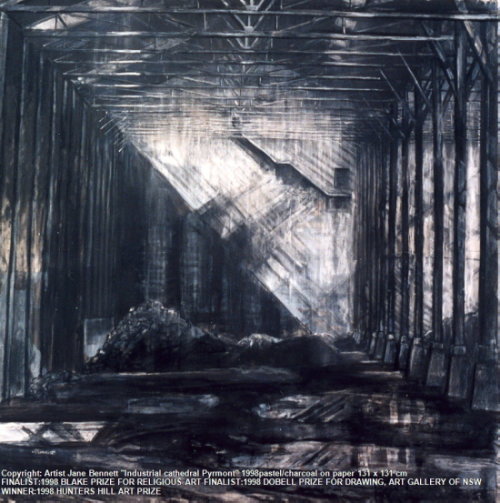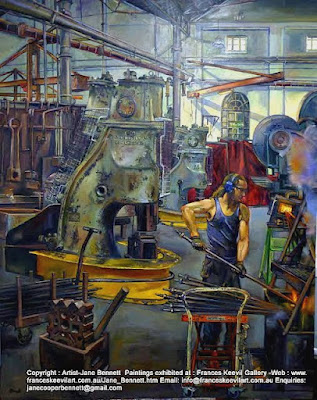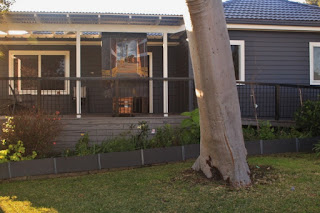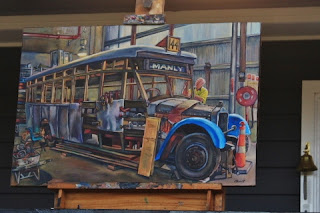Today's painting on the deck shows a small panorama of Sydney Harbour with a cargo ship berthed at the East Darling Harbour Wharves in the background. The strange looking building in the centre surrounded by piles of timber is the REVY C building on Darling Island. I painted it in the early 1990s from Ways Terrace.
P8'REVY C from Ways Terrace'
1992 oil on canvas 31 x 61cm
On Darling Island, nothing is now left of the timber and shipbuilding yards. Today the water’s edge bristles with new apartment blocks gazing over sheltered waters. Yet beneath the silvery surface lies a hidden history.
The Royal Edward Victualling Yard, ( REVY A,B & C), was built between 1890 and 1911, by the revered Government architect Walter Liberty Vernon in the Federation Free style.
They were some of the last working buildings on the Pyrmont waterfront and had rivettingly odd architecture. Revy
A and B consisted of a 5 storey and a 6 storey pair of large red brick warehouses set at right angles to each other and linked by a square central
water reservoir tower. They were built in a flamboyant neo-Gothic style which reminded me irresistibly of the Bargello in Florence.
P8'REVY C from Ways Terrace'
1992 oil on canvas 31 x 61cm
1992 oil on canvas 31 x 61cm
Revy C is a narrow, skinny, rather ungainly eight-storey, red brick Federation
Warehouse, and still the tallest structure on Darling Island. It had a rusticated ashlar
bluestone ground floor, and a riveted truss
jib crane facing Jones Bay Wharf. Its 4 large lift towers on the
roof always reminded me of the crenellations on top of medieval castles.
Early fire fighting relied on steam pumped water pressure which could only reach up to a maximum of 2 storeys. So the set of external steel fire stairs at either end were a very practical solution to this problem, even though I used to curse them for being a perspective nightmare to paint.
Early fire fighting relied on steam pumped water pressure which could only reach up to a maximum of 2 storeys. So the set of external steel fire stairs at either end were a very practical solution to this problem, even though I used to curse them for being a perspective nightmare to paint.
P12B REVY 3 from Jones Bay Wharf with 'Nederburg'
1990 oil on canvas 25 x 51 cm
SOLD
Enquiries about other paintings of Darling Island
Revy's original purpose became obsolete due to the increasing size of cargo ships and the introduction of container shipping.
The painting above shows the 'Nederburg' one of the last cargo ships docking at the Pier 19/20/21 (now known as Jones Bay Wharf) opposite Revy C.
During the 1980s REVY C was remodelled for the Defence Science and Technology Organization.

P12 REVY from Jones Bay Road
1990 oil on paper 25.5 x 31 cm
Available for sale
1990 oil on canvas 25 x 51 cm
SOLD
Enquiries about other paintings of Darling Island
Revy's original purpose became obsolete due to the increasing size of cargo ships and the introduction of container shipping.
The painting above shows the 'Nederburg' one of the last cargo ships docking at the Pier 19/20/21 (now known as Jones Bay Wharf) opposite Revy C.
During the 1980s REVY C was remodelled for the Defence Science and Technology Organization.

P12 REVY from Jones Bay Road
1990 oil on paper 25.5 x 31 cm
Available for sale
This small oil study shows the timber yard on the other side to the previous painting.
In 1994, REVY A and B were renovated for Naval Support Command , and I was commissioned to paint 3 huge paintings for their foyer.
They could be seen from Jones Bay Road until 2005 when Channel 7 moved in. Now these paintings are on Spectacle Island, where unfortunately they can't be seen by the public.
REVY C
was vacant from 2005 until its recent redevelopment for apartments.
Related Posts





















